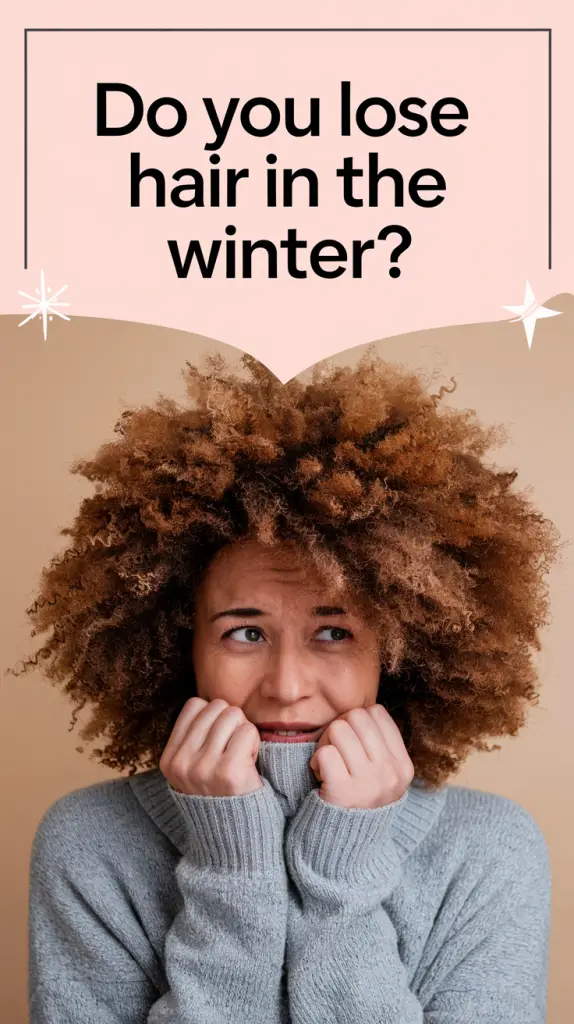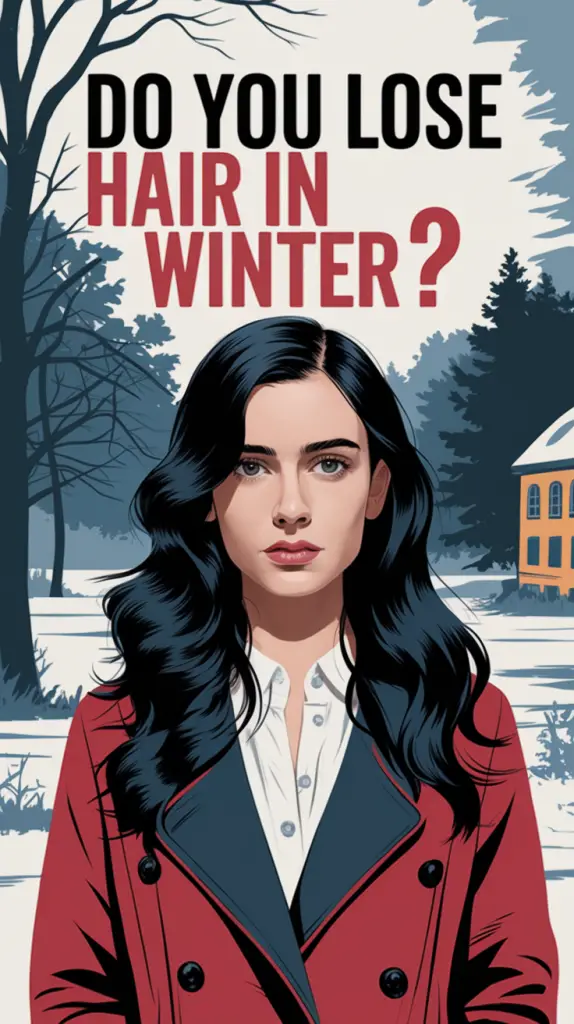Do You Lose Hair in Winter? A Complete Guide to Understanding and Preventing Seasonal Hair Loss
Your hair might have a tough time this winter. If you’ve been noticing more hairs on your pillow or in your bathtub drain than usual, or if you’ve been counting them on your comb more often, don’t worry. It’s not uncommon to notice more hair falling out during the winter months. While it can be a bit distressing, it’s generally considered to be part of the natural hair cycle. But what causes hair loss in winter? Is there anything you can do to prevent it? In this guide, I’ll explain why your hair might be losing more during the winter, look at the science behind it, and show you some simple ways you can keep your hair healthy all year round.
The Science Behind Winter Hair Loss
It’s a well-known fact that many people experience hair loss in the winter, and it’s influenced by a number of factors. Let’s take a closer look at the biochemical and natural reasons behind this seasonal phenomenon.
The Hair Growth Cycle
This is why your hair becomes more delicate, and why it’s important to look after it. The hair growth cycle actually has four stages:
- Anagen (Growth phase): It is the stage that the hair is full of health and grows out of the follicle that could last from 2 to 7 years.
- Catagen (Transition phase): The growth of the hair ends and the follicle shrinks.
- Telogen (Resting phase): The hair is no longer growing but it still stays attached to the follicle.
- Exogen (Shedding phase): The hair then falls out, allowing space for new hair to grow.

It’s pretty common to see hair in the exogen phase of the hair cycle during the winter. This is because the hair that entered the phase in the summer is now shedding and leaving the scalp as the temperature starts to drop.
| Hair Cycle Phase | Duration | Impact During Winter |
|---|---|---|
| Anagen | 2-7 years (growth phase) | Less hair enters this phase due to low vitamin D |
| Telogen | 3 months (resting phase) | More hair enters this phase during colder months |
| Exogen | Varies (shedding phase) | Hair in this phase sheds, often during winter |
Environmental Factors
During the cold months, frizz and dryness are two of the main issues that hair tends to face. Below, we’ll look at how the environment affects seasonal shedding.
- Dry Air: Winter air is significantly drier than in other seasons. This lack of intimacy leaves your scalp and hair dehydrated, which results in dandruff, itchiness, and weakened hair follicles. When moisture is absent, hair is more likely to break and fall out.
- Indoor Heating: Apart from the usual problems, such as cracked hands and flu cases, skin and hair are also among the victims of indoor heating. When you’re constantly moving between the cold outdoors and warm, heated indoor spaces, the contrast in temperature can strip your hair of essential oils, leaving it dry and brittle.
Hormonal Changes
During the winter, when there’s less sunlight, people don’t get enough vitamin D, which is needed to produce hair follicles and therefore encourage hair growth. That means low vitamin D levels might also be linked to hair growth issues, which could result in more hair than usual going through the shedding phase.
Dietary and Lifestyle Changes in Winter
Many people change their way of living, which can actually be a reason for hair loss. Making sure we get enough nutrients is a great way to give our hair a boost. Eating the right foods gives your hair a regular supply of the nutrients it needs to grow.
Nutrient Deficiency
During the winter months, it’s important to maintain a balanced diet to keep your hair healthy. On the contrary, many people turn to comfort foods that have minimal amounts of zinc, iron, biotin, and omega-3 fatty acids, all of which are essential for strong and healthy hair. By incorporating these nutrients, you can also help to prevent hair loss at the root.
| Nutrient | Role in Hair Health | Food Sources |
|---|---|---|
| Vitamin D | Stimulates hair follicles | Salmon, fortified dairy, mushrooms |
| Zinc | Supports hair tissue growth and repair | Oysters, nuts, beans |
| Biotin | Strengthens hair strands | Eggs, almonds, sweet potatoes |
| Omega-3 fatty acids | Keeps the scalp hydrated and prevents inflammation | Fatty fish, flaxseeds, walnuts |
Stress and Hair Shedding
The winter season is typically a busy time for people who are enjoying their holidays, wrapping up the work year, and experiencing seasonal depression. Stress can also cause a condition called telogen effluvium, which is when more hair bulbs go into the resting phase and then collapse. The idea is to develop relaxation skills like watching nature, going for outdoor activities, or appreciating the color of green trees, not just during the holidays. It’s also helpful to recognize how nature’s colors, patterns, and symmetries can contribute to relaxation.
How to Prevent Hair Loss in Winter!
Now that we’ve identified the causes of winter hair loss, we can start working on a solution. While you can’t avoid shedding, these tips will help keep your hair loss low in winter.
Hydration is Key
An efficient method in order to treat hair loss in winter is to keep your hair hydrated. In this way, you should:
- Use shampoos and conditioners that are moisturizing for the care of your scalp and hair.
- Include weekly hair procedures or hair masks that concentrate on moisture restoration and hair strengthening.
- Natural oils like coconut oil or argan oil can be given to the scalp and hair to retain moisture and improve resilience.
Avoid Heat Damage
Those scorching hot showers that make winter bearable can also be a major cause of scalp dryness. Do you want to see some hair? I have a number of heat styling tools, including blow dryers, straighteners, and curling irons. When you’re using heat styling equipment, make sure to apply a heat protectant spray.
| Cause | Impact on Hair | Prevention |
|---|---|---|
| Hot water | Strips hair of natural oils | Use lukewarm water |
| Heat styling tools | Causes hair breakage | Use heat protectant sprays |
| Indoor heating | Dries out hair | Use a humidifier indoors to add moisture |
Protect Your Hair from the Cold
The main thing hats do is keep our hair from getting dry and bristly. Just a heads-up: Only use hats made from silk or satin to avoid static! Silk and satin can help reduce friction and breakage. You might even want to think about not using wool or cotton hats, as they can sometimes damage your hair, and instead go for something softer.

Adjust Your Diet
Eating foods that are rich in hair-nourishing ingredients can help your hair become stronger and more robust. It’s a good idea to eat foods that are rich in vitamin D, zinc, and omega-3 fatty acids. If you’re not getting all the nutrients you need from your diet, you can use supplements to make up for it. Ask your primary care provider or a nutritionist to learn more about how your body works and what options might be right for you.
Conclusion
It’s frustrating when you lose hair in the winter, but it’s important to remember that this is a normal part of the hair cycle for many people. The key is understanding why your hair sheds seasonally and making a few simple changes to your hair care routine, diet, and lifestyle. These changes can help make your hair stronger and more resilient during the winter. It’s important to stay hydrated, avoid excessive heat, and use the right products and nutrients to keep your scalp healthy. Needless to say, you can’t stop hair loss, but you can definitely make your hair thick and smooth. You can always count on these tips to work their magic. This will help you prevent hair loss and keep your hair strong and shiny, no matter what season it is.
FAQs
1. Is winter hair loss permanent?
No, winter hair loss is usually just a temporary thing and should stop as the seasons change. Hair that falls out in the winter will usually grow back in the spring.
2. How long does winter hair shedding last?
How long winter hair shedding lasts can vary quite a bit, depending on your hair’s natural growth cycle and the environmental factors involved. It can range from a few weeks to a couple of months.
3. What should I eat to prevent winter hair loss?
Adding foods rich in vitamin D, zinc, and omega-3 fatty acids to your diet can help reduce winter hair loss. Salmon, eggs, nuts, and leafy greens are all great options.
4. Can cold weather directly cause hair loss?
Cold weather itself doesn’t cause hair loss, but the dryness it brings can lead to scalp issues like dandruff and dehydration, which can weaken hair and lead to shedding.
5. What are some quick ways to prevent hair breakage in winter?
Use moisturizing hair products, cut down on heat styling, wear silk-lined hats, and make sure your scalp is hydrated. You can also use leave-in conditioners and oils to keep your hair from getting dry.
